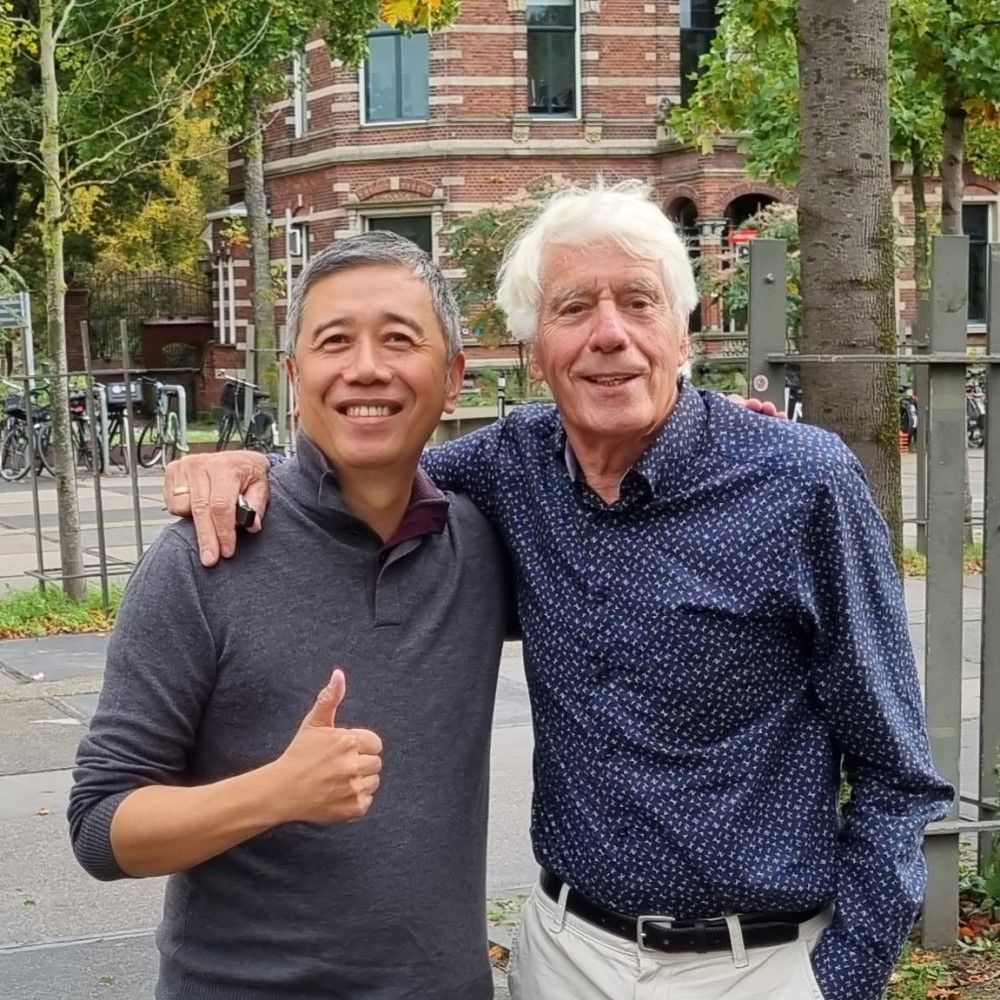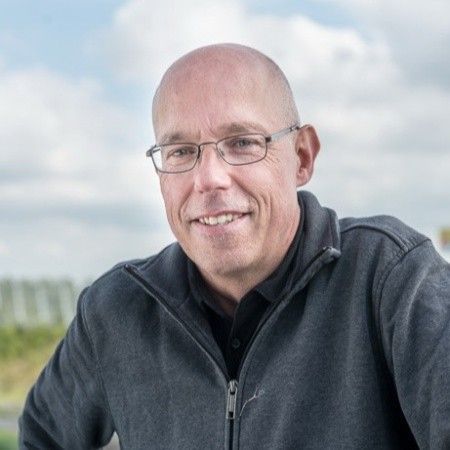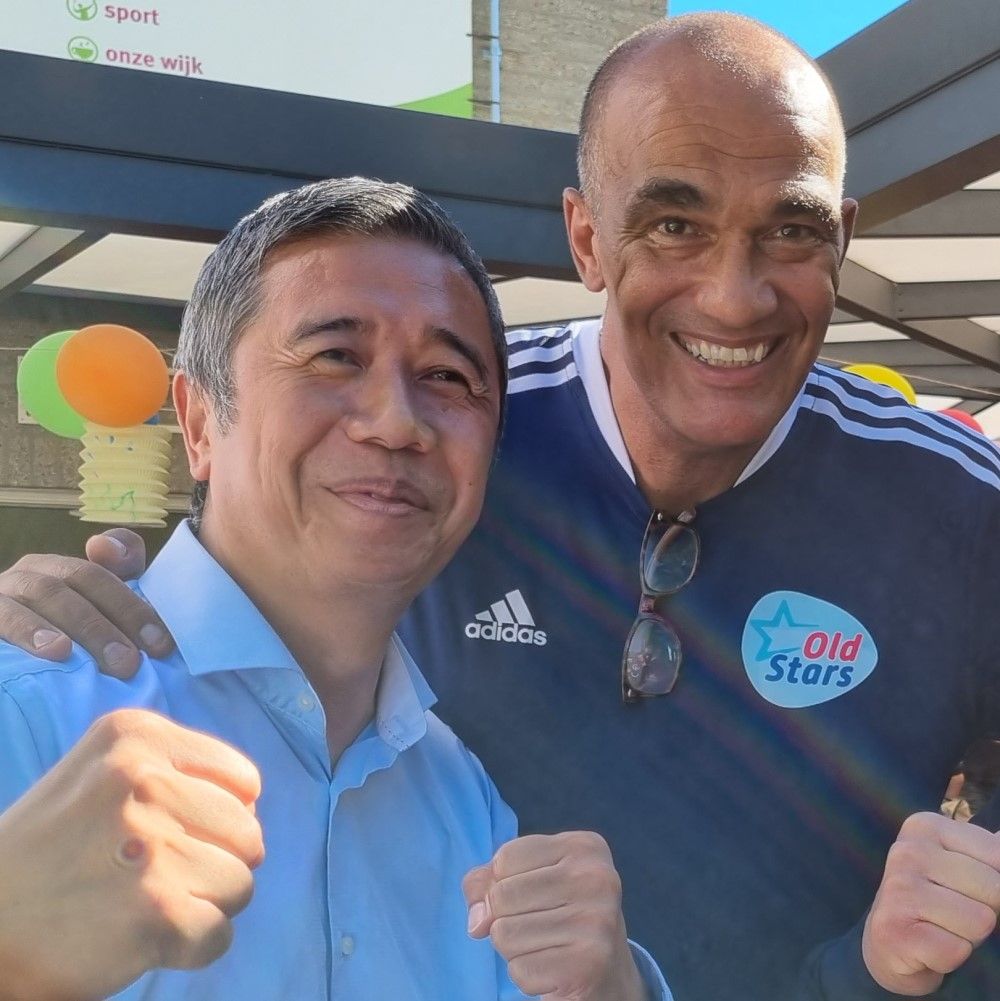Nederland met een PLAN
Advisers

Klaas Wilting (Sleen, 1943)
In the mid-1960s, Klaas joined the police force in Amsterdam. After years of surveillance, walking, cycling and driving, he became a mentor and taught young people the police profession. Handing out fines, investigating criminal activities, handling traffic incidents, crisis intervention, such as solving neighbourhood quarrels, marital disputes, fights and so much more.
He was then promoted to group commander and taught criminal law, criminal procedure, civil law and constitutional law and examined these subjects. In the 1980s, he became project manager for information and publicity as part of the reorganisation of the Amsterdam police.
One of his first major cases as police spokesperson was the kidnapping case of beer magnate Alfred Heineken and his driver Ab Doderer. This was followed by media reports of sad low points but also of nice social successes.
A corps report was issued every working day, allowing police officers from high to low to communicate openly with each other. Klaas gave and still gives lectures and media training throughout the country. Besides police work, he wrote as a correspondent for daily newspapers, reporting on a wide range of topics. He also published two books about his turbulent years in the police force.
A quarter of a century ago, he ended his career with the police force and was made a Knight of the Order of Orange Nassau. In 2005, he made a move into politics by founding the Party for Justice, Decisiveness and Progress. Klaas is an ambassador for volunteer organisation Europa Kinderhulp and supports the Dorcas foundation in Andijk.
As an expert on the work of police, justice and the judiciary, and from his media and communications experience, Klaas now also advises the Netherlands with a PLAN on a safer and more liveable society.

Boudewijn Rückert
A board member of Huurdersvereniging De Pijp in Amsterdam, and an activist with residents' collective FAIRcity Amsterdam and urban action group Niet Te Koop, Boudewijn has been fighting against the sale of social housing for rent locally and nationally since 2015. He is deeply concerned about the change in population composition in big cities that is becoming less diverse due to the sales strategies of housing corporations and weak government policies, but also worries about older residents who are thus driven out of their neighbourhoods.
The social costs of the disappearance of neighbourhood cohesion are not calculated ánd are not borne by corporations or property developers.
"Houses on lower floors are in demand by individuals. There you can build out to the garden or add a basement. Elderly people are now being gentrified away. We won't let that happen.
Housing associations are putting old social housing on sale to finance housing construction in other places. Far outside the city centre, on cheap land. By doing so, they sell their silverware and it becomes impossible for many people to continue living in the neighbourhood.
Above all, we see a lot of sales and hardly any social housing being added. We have been conned. There is no penalty or brake anywhere. Sales continue, but new construction lags behind, with no penalties for the corporations."
Action group Not For Sale argues that housing associations say they need the money from the sale to build new social housing, but nothing could be further from the truth. The money goes on idiotically high salaries and gilt-edged pension schemes for the top board and management, money wasting and inefficient work organisations, property speculation and investment excesses that have nothing to do with social housing, building/converting to much less, smaller and more expensive housing with temporary/flexible tenancies, building/converting to expensive free sector rental housing that is financially unfeasible for most social tenants.
Less affordable housing means more people forced to look for more expensive housing or forced to leave the city. This means that people with essential professions (teachers, nurses, firefighters, etc.), among others, will increasingly disappear from a big city. Consequently, there will be a decreasing availability of socially relevant services in a city. Furthermore, the departure of low- and middle-income earners will have a negative effect on the diversity of the population in neighbourhoods, city districts and the city as a whole: in short, socio-economic cleansing and gentrification.

Dr. Jinling Li
Dr. Jinling Li has lived in the Netherlands for over twenty years. As a migrant of Chinese descent, her interest in languages, societies and identities led her to delve specifically into the topic of identity.
She successfully completed her master's degree in Intercultural Communication in 2009, followed by a PhD in 2016.
After obtaining her doctorate in sociolinguistic anthropology and an academic career, including many scholarly publications and speeches at leading universities worldwide, she broadened her interest to the real estate industry. Dr. Jinling Li believes that living is about more than just buildings. Above all, it is about people. We live in a world that is constantly changing, and the real estate industry faces many challenges and issues in today's society.
How can we maintain housing affordability?
How can we strive for an inclusive, sustainable society? How can we contribute to the fight against climate change?
As a researcher and co-owner of independent real estate developer FOUR-D (FOcus URban Development) in the creative heart of Eindhoven, Dr. Jinling Li focuses on innovative, integrated solutions for sustainable, accessible, inclusive and climate-resilient neighborhoods and cities.
In this capacity, Dr. Jinling Li advises NL PLAN on building science and how the citizens of the Netherlands, with or without a different cultural background, can best manifest themselves in a rapidly changing society, and how to bring back balance to living, working and leisure.
Summary of the book: Chineseness as a Moving Target: Changing Infrastructures of the Chinese Diaspora in The Netherlands, Doctoral dissertation, Tilburg University, 2016.
Identity labels such as Chinese have an intuitive sound of clarity and transparency. In today's world, such labels continue to act as powerful emblems around which people gather and mobilize. However, such processes of what we might call "traditional" identification now coexist and compete with the increasingly complex and often seemingly contradictory realities of identification that redefine the stability and transparency of older labels. Exploring the difficult transition from one model of identification to multiple others is the thematic domain in which this study is situated.
The results of the in-depth analyses of the wide range of ethnographic on- and offline data in this book reveal identity issues and language ideologies of transnational Chinese migrants around the displacement of the concept of being Chinese in everyday self-presentation, as in linguistic and discursive orientation. Whereas the current literature often argues that identities from the diaspora show homogenization as a consequence of globalization, this book shows that globalization processes create more diversification, at different scales that interact in a polycentric pattern.

Arnold Vanderlyde (Sittard, 1963)
Former professional boxer Arnold Vanderlyde was a three-time European champion and won bronze in the Heavyweight category three times in his sporting career at the Olympic Games in Los Angeles (1984), Seoul (1988) and Barcelona (1992). He was also a three-time European and eight-time Dutch champion.
In 1993, he hung up his boxing gloves and switched to business. With his own organisation Vanderlyde Sport & Business, he gives presentations, practical lessons and stimulating (vitality) training for people working for a company, but also for older people. Not only in sport, but also in business, it is important to think positively and, above all, to tackle things positively so that you can excel.
In 2009, Arnold presented his book Fighting for success! (Arko Sports Media BV), which, besides his biography, also describes eight Fighting values and a method that is not only applicable to (top) athletes, but also to individuals, teams and organisations.
With his method, Arnold teaches you not to let setbacks get you down, because whatever the result, it always offers new perspective. And besides: the process needed to reach the finish line is the most important thing. The road towards it, that is what matters.
On 5 September, Arnold kicked off OldStars Vitaal in Arnhem with a boxing clinic and advice on growing old vitally. The National Elderly Fund organised this exercise and lifestyle programme for Asian elderly in cooperation with initiator Cheng Liu of Wanyuan Foundation, Chinese elderly associations in Arnhem, Sportbedrijf Arnhem and Stichting Welzijn Ouderen Arnhem.
The Netherlands will face enormous ageing in the coming decades. This will include around three million elderly people from different ethnic backgrounds. It is good to already consider initiatives to preserve one's own culture and get moving together.
At the OldStars Vitaal event, Arnold expressed his support for NL PLAN, making him a highly appreciated ambassador who has a wealth of experience thanks to a combination of his successful sports career, studies at the Hogeschool voor Sportmanagement in Groningen and years of knowledge gained in giving seminars and coaching programmes.
Arnold: "The quality of your fight is the quality of your communication."



